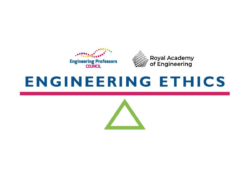 Authors: Matthew Studley (UWE Bristol); Sarah Jayne Hitt, Ph.D. SFHEA (NMITE, Edinburgh Napier University).
Authors: Matthew Studley (UWE Bristol); Sarah Jayne Hitt, Ph.D. SFHEA (NMITE, Edinburgh Napier University).
Keywords: Pedagogy; Personal ethics; Risk.
Who is this article for? This article should be read by educators at all levels in higher education who wish to integrate ethics into the engineering and design curriculum, or into module design and learning activities. It describes techniques that can help to provide students with opportunities to practise the communication and critical thinking skills that employers are looking for.
Premise:
Discussing ethical issues can be a daunting prospect, whether one-to-one or with an entire classroom. Ethics often addresses topics and decisions related to moral choices and delicate situations about which people may have firm and long-held beliefs. Additionally, these issues are often rooted in underlying values which may differ between people, cultures, or even time periods. For instance, something that was considered immoral or unethical in a rural community in 18th-century Ireland may have been viewed very differently at the same time in urban India. Because students come from different backgrounds and experiences, it is essential to be sensitive to this context (Kirk and Flammia, 2016). However, ethics also requires that we address tough topics in order to make decisions about what we should do in difficult situations, such as those encountered by engineers in their personal, professional, and civic lives.
Why we need to be sensitive in discussions about ethics:
Discussions about tough topics can be ‘triggering’. Psychologists define a psychological ‘trigger’ as a stimulus that causes a painful memory to resurface. A trigger can be any reminder of the traumatic event: a sound, sight, smell, physical sensation, words, or images. When a person is triggered, they’re being provoked by a stimulus that awakens or worsens the symptoms of a traumatic event or mental health condition (Gerdes, 2019). A person’s strong reaction to being triggered may come as a surprise to others because the response seems out of proportion to the stimulus, because the triggered individual is mentally reliving the original trauma. Some neurodivergencies can adapt these responses. For example, people with autism spectrum disorder (ASD) may experience stronger emotional reactions and may present this in ways which are unfamiliar or surprising to those who have not experienced the same challenges (Fuld, 2018).
Apart from triggering memories, the topics of right and wrong may be emotive. Young people are often passionate in their beliefs and may be moved to strong responses. There is nothing wrong with that, unless one person’s strong response makes another’s participation and expression less likely.
Ethics is only salient if the topics are tough:
Ethics concerns questions of moral value, of right and wrong, and relates to our deep-held beliefs and emotions. If any experience in an engineer’s education is likely to cause unpleasant memories to surface, or to stimulate strong discussion, it’s likely to be Ethics, and some of our students may have an emotional response to the topics of discussion and their impacts. This might be enough to make many educators shy away from integrating ethics.
However, research has shown that most engineers are moved by their personal sense of moral value, rather than by abstract external standards, and this can create very powerful and impactful learning experiences (Génova and González, 2016). To teach Ethics, we need to be willing to engage emotionally. Students also appreciate when educators can be vulnerable in the same way that we ask them to be, which means being willing to be honest about our own reactions to tough topics.
Approaches to tackling tough topics:
a. Prepare by reviewing resources
Several resources exist to guide educators who are engaging with tough topics in the classroom. Teaching and learning specialists recognise the challenges inherent in engaging with this kind of activity, yet also want to support educators who see the value in creating a space for students to wrestle with the difficult questions that they will encounter in the future. Many centres of teaching and learning at universities provide strategies and guidance through websites or pamphlets that are easily found by searching online. We include a list of some of our preferred resources below.
b. Prepare by finding local support
Even though we will avoid obvious triggers, there’s always the possibility that our students may become upset. We should be prepared by promoting the contact details for local support services within the institution. It can never be a bad thing for our students to know about these.
c. Give warnings and ask for consent
You might want to warn your students that discussing ethical matters is not without emotional consequence. At your discretion, seek their explicit consent to continue. There has been some criticism of this approach in the media, as some authors suggest that this infantilises the audience. Indeed, the pros and cons of trigger warnings might make an interesting topic for discussion: life can be cruel, is there value in developing a thick skin? What do we lose in this process? Being honest about your own hesitations and internal conflicts might encourage students to open up about how they wrestle with their own dilemmas. To be fully supportive, consider an advanced warning with the option to opt-out so that people aren’t stampeded into something they might prefer to avoid.
d. Recognise discomfort, and respond
Be aware of the possibility that individuals in your group could become upset. Be prepared to quietly offer time out or to change the activity in response to where the students want to take the discussion. Again, being transparent with the students that some people may be uncomfortable or upset by topics can reveal another relevant ethical topic – how to be respectful of others whose response differs from your own. And being willing to change the activity demonstrates the flexibility and adaptability required of 21st century engineers!
e. Avoid unnecessary risk
Some topics are best avoided due to the strength of emotion which they might trigger in students whose life story may be unknown to us. These topics include sexual abuse, self-harm, violence, eating disorders, homophobia, transphobia, racism, child abuse and paedophilia, and rape.
Be kind, and be brave:
Above all, let your students know that you care for their well-being. If we are to teach Ethics, let us be ethical. You might need to overcome some awkward moments with your students, but you will all learn and grow in the process!
References:
Fuld S. (2018) ‘Autism spectrum disorder: The Impact of stressful and traumatic life events and implications for clinical practice.’ Clinical Social Work Journal 46(3), pp. 210-219.
Génova, G., and González, M.R. (2016) ‘Teaching ethics to engineers: A Socratic experience,’ Science and Engineering Ethics 22, pp. 567–580.
Gerdes, K. (2019) ‘Trauma, trigger warnings, and the rhetoric of sensitivity,’ Rhetoric Society Quarterly, 49(1), pp. 3-24.
Kirk S. A. and Flammia, M. (2016) ‘Teaching the ethics of intercultural communication,’ in Teaching and Training for Global Engineering: Perspectives on Culture and Professional Communication Practices, pp.91-124.
Additional resources:
- Strategies for Engaging with Difficult Topics, Strong Emotions, and Challenging Moments in the Classroom – University of Oregon Teaching Engagement Program
- How to Talk about Ethical Issues in the Classroom – Greater Good Magazine, University of Berkeley
- Managing Difficult Classroom Discussions – University of Indiana Center for Innovative Teaching and Learning
- Guidelines for Discussing Difficult or High-Stakes Topics – University of Michigan Center for Research on Learning and Teaching
This work is licensed under a Creative Commons Attribution-ShareAlike 4.0 International License.
Any views, thoughts, and opinions expressed herein are solely that of the author(s) and do not necessarily reflect the views, opinions, policies, or position of the Engineering Professors’ Council or the Toolkit sponsors and supporters.
